Sleep, you pig – scary Icelandic lullabies. Posted by hulda on Sep 3, 2015 in Icelandic culture, Icelandic customs, Icelandic history
Sofðu nú svínið þitt
svartur í augum
Farðu í fúlan pytt
fullan af draugum.
(= Sleep now you black-eyed pig, fall in a deep pit of ghosts.)
Lately this little lullaby has been popular on quite a few social media sites, gathering people’s attention simply by being a really horrible-sounding thing to sing to the little ones. Alas, it’s not real; it’s actually from the book Salka Valka by Halldór Laxness. Very few people have questioned the origin of the song though, not even Icelandic people. What’s going on?
Laxness was a clever satirist, and the scary poem does not in fact fall far from the style of traditional Icelandic lullabies! No one’s challenging his lullaby because it sounds so much like Icelandic lullabies in general do, probably exactly how he meant it to. Let’s look at some real ones next!
Bí, bí og blaka álftirnar kvaka. Ég læt sem ég sofi en samt mun ég vaka.
Bíum, bíum, bamba, börnin litlu ramba fram á fjallakamba ad leita sér lamba.
(= Bi, bi and blaka the swans sing. I pretend to sleep but I’m still awake.
Bium, bium, bamba, little children wander on the mountain cliffs in search of sheep.)
Starting with a softer one we have Bí, bí og blaka. It only starts to sound a little upsetting if you think the lyrics a bit further and wonder why children would be in such a perilous situation at night hours, and why does the singer state that although they seem as if they were asleep they’re actually awake?

Barnafoss by Ingeborg Breitfeld at Wikimedia Commons. This is where the next song was first sung at.
Continuing on the theme of children in peril we have Sofðu unga ástin mín.
Sofðu, unga ástin mín,
– úti regnið grætur.
Mamma geymir gullin þín,
gamla leggi og völuskrín.
Við skulum ekki vaka um dimmar nætur.
(= Sleep my little love – outside the rain is crying. Mother hides your treasures, old leg bone and box of playthings. We shall not stay awake when night is dark.)
Það er margt sem myrkrið veit,
– minn er hugur þungur.
Oft ég svarta sandinn leit
svíða grænan engireit.
Í jöklinum hljóða dauðadjúpar sprungur.
(= There’s much that darkness knows, my thoughts are heavy. Often I watched the black sand burning green meadows. On the glacier cry deadly-deep ice-cracks.)
Sofðu lengi, sofðu rótt,
seint mun bezt að vakna.
Mæðan kenna mun þér fljótt,
meðan hallar degi skjótt,
að mennirnir elska, missa, gráta og sakna.
(= Sleep long, sleep peacefully, it’s best to awaken late. Hardship teaches you fast, while day turns to night, that people love, lose, cry and mourn.)
A longer one but I felt the lyrics were all crucial to the story of this song that was originally written for the play Fjalla-Eyvindur. It’s a popular lullaby and very beautiful, but the unnerving part is in the backstory: in Fjalla-Eyvindur the person singing this song is his wife Halla, who lulls their child to sleep before drowning it in Barnafoss waterfall…
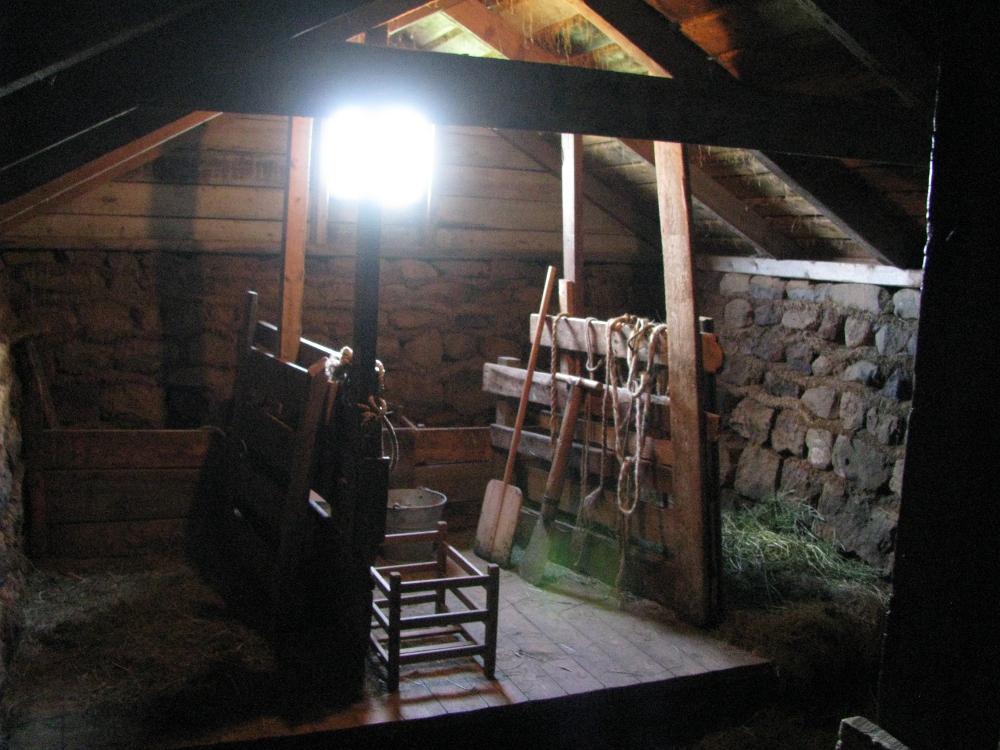
Árbæjarsafn example of a traditional Icelandic barn – it’s attached to the house with a long, dark turf corridor.
Móðir mín í kví, kví, kvíddú ekki því, því
Ég skal ljá þér duluna mína, duluna mína að dansa í.
(= My mother in the sheep pen, don’t fret, I shall lend you my rags, my rags to dance in.)
Of course I couldn’t leave out this one when talking about creepy lullabies! Móðir mín í kví kví belongs to a folk legend of a woman who got pregnant out of wedlock and, since pregnancy out of wedlock was a crime worth death penalty, gave birth in secret, wrapped the baby in rags and abandoned it to die.
Later on as she and another servant woman were milking sheep she mentioned that she had no proper clothes to wear in the oncoming dances, at which a child’s voice sang the song from under the sheep pen. The woman lost her sanity out of shock.
Unlike Laxness’ lullaby, this one and the story behind it are very well-known throughout the land, but according to quite a few online discussions people still sing it to their children as a lullaby! Still, when it comes to the strongest trauma-causing material Móðir mín í kví kví takes only silver. The unchallenged winner is Bíum bíum bambaló.
Bíum bíum bambaló, bambaló og dillidillidó
Vini mínum vagga ég í ró
En úti biður andlit á glugga.
(= Bium bium bambalo, bambalo and dillidillido, My friend I lull to sleep, but outside waits a face at the window.)
Not very sleepy now are you? There are many theories to what the face might refer to, going from the father of the child to a friend of the person singing or even the full moon, but who cares when the song is just so scary. If we want to compare this to folk tales there’s one creature in particular that likes to lurk at windows: a troll looking for the next meal.
Whatever the reason, Icelanders do seem to have a strange preference for unsettling lullabies! Perhaps the point is that even if they don’t help anyone to sleep, scaring the children quiet is faster and easier anyway? Or in the words of yet another one –
Við skulum ekki hafa hátt
Hér er margt að ugga.
Eg hef heyrt í alla nátt
Andardrátt á glugga
(= We should not be loud, many are sneaking around here. All night I have heard breathing at the window.)
Do you know any scary lullabies from your home country? I’d love to hear of them in the comments!
…all of these lullabies of course!
Bí, bí og blaka (link)
Sofðu unga ástin mín (link)
Móðir mín í kví kví (link)
Bíum bíum bambaló (link)

Build vocabulary, practice pronunciation, and more with Transparent Language Online. Available anytime, anywhere, on any device.
About the Author: hulda
Hi, I'm Hulda, originally Finnish but now living in the suburbs of Reykjavík. I'm here to help you in any way I can if you're considering learning Icelandic. Nice to meet you!



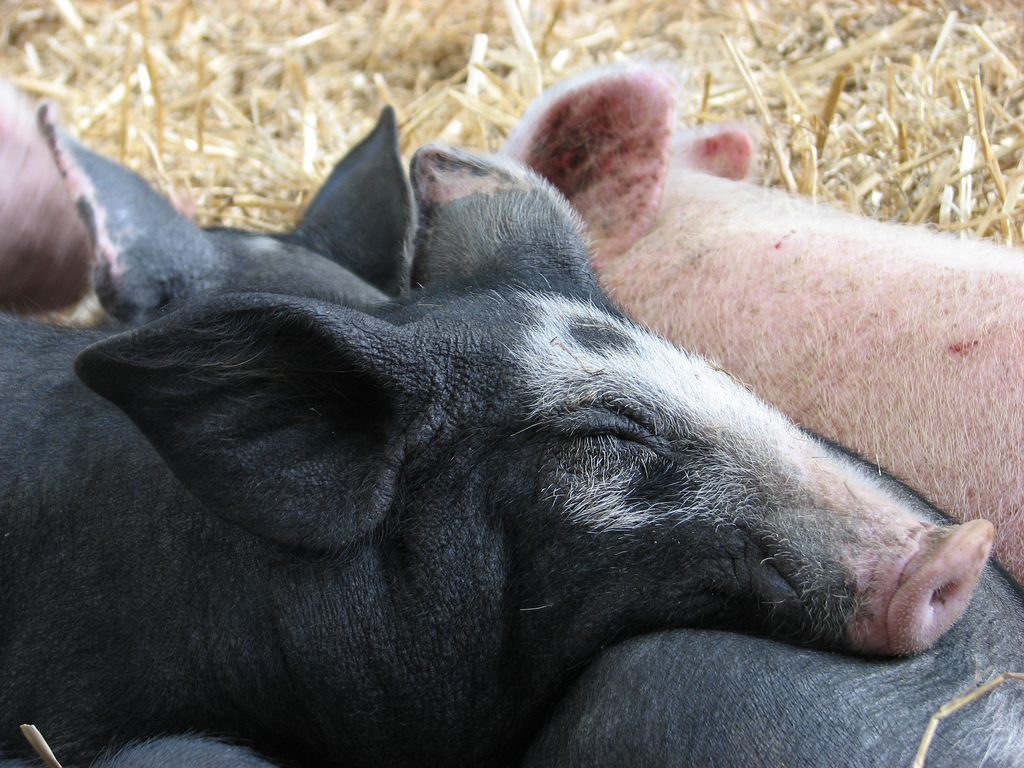
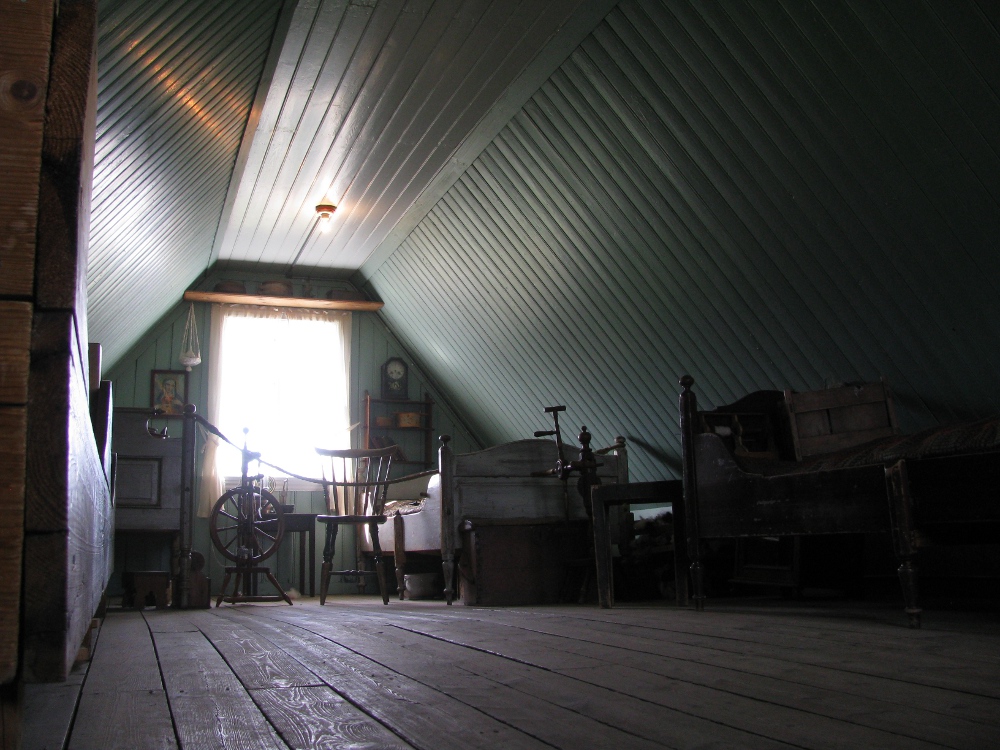
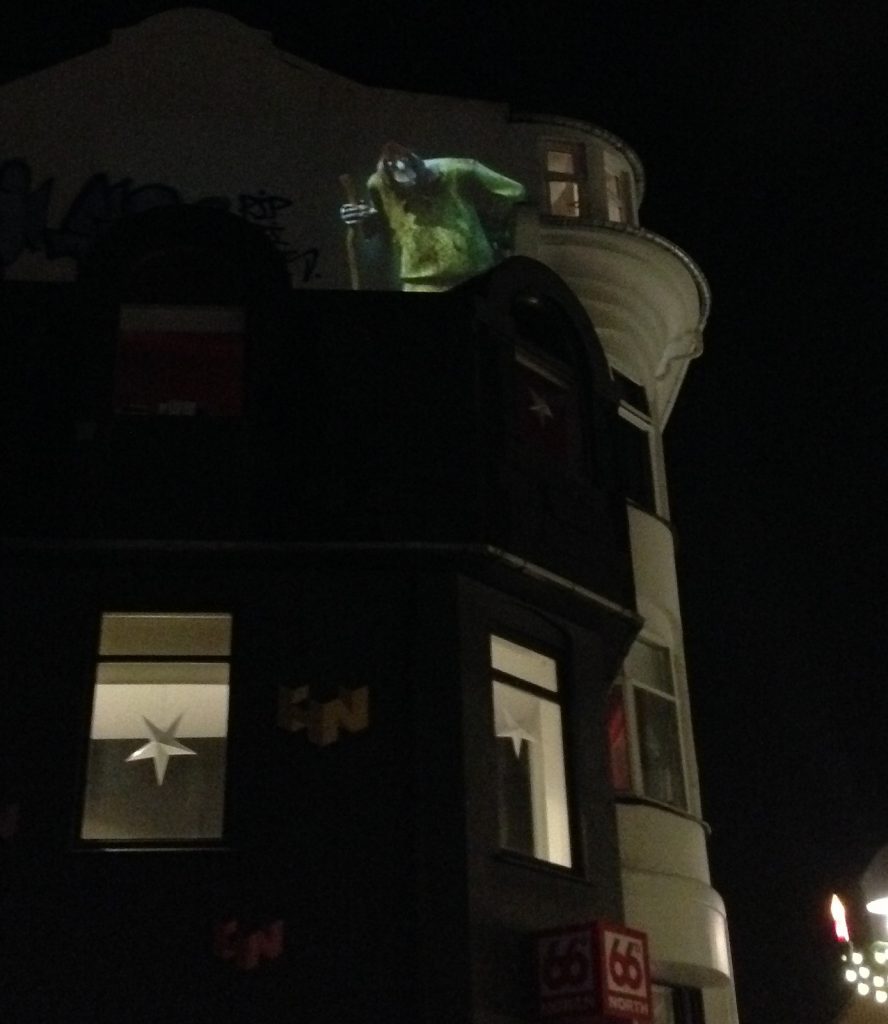
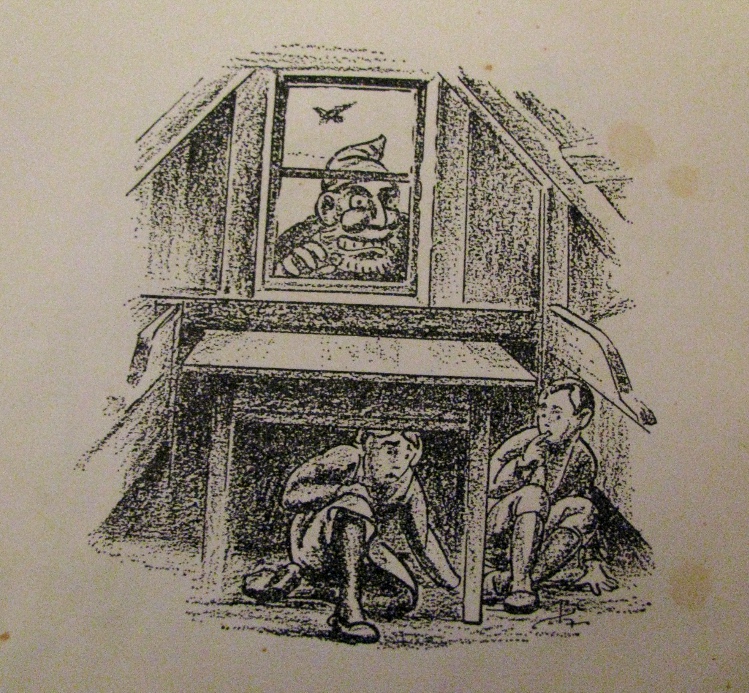


Comments:
bobriha:
In Russian we have this lullaby:
Баю, баюшки-баю, не ложися на краю
Придёт серенький волчок и укусит за бочок
(bayu, bayushki-bayu, nie lozhisya na krayu
pridyot sierienkiy volchyok i ukusit za bochyok)
Which is may be translated like:
bayu, bayushki-bayu, don’t lay down near the edge
the gray wolf will come and bite your side
Well, in original deminutives soften the meaning, but still! Ancestors, what was wrong with you?!
hulda:
@bobriha Hi bobriha!
Thank you for the lullaby, it actually does sound like a scary one. It reminds me of how I used to made sure I was completely under the covers because else the monster under the bed might have got me… somehow. 😀 Maybe it’s not just Iceland but people of old in general, for some reason scaring children right before bedtime was ok?
bobriha:
@hulda I remember I’ve read a book by Jane Goodall about her research works on hyenas. Her son was little then so she took him with her to the field. As she sometimes had to lull a baby and make field records in one and the same moment, she basically sang her notes in lullaby tones. And among those were (I read it of course in Russian translate so I can’t bet these are exactly the words from original book) lines like “Bloody Mary has returned from hunt and brought a leg in her mouth and her neck and snout are covered with blood”.
And then my thoughts made another one turn: maybe these scary lullabies were once upon a time just desperate attemt by exhausted adults to stay awake themselves while lulling their babies?
hulda:
@bobriha Hahahaha that’s actually a really funny idea! Icelanders used to believe that the inside of a house was the only safe place there was during the night, maybe the adults managed to scare themselves so well that it eventually turned into a habit.
Signe Franks:
How splendid!
I love the dark side of lullabies: the new album by the Wainwright sisters: Songs in the Dark has some good ones.
I think they often reflect the desperation of a mother trying to get some time for herself. Often a baby will be offered all kinds of lovely things (golden apples)if she’ll only go to sleep, and towards the end, out of sheer desperation and despair come these horrors and threats.
There is a great South African (Afrikaans) one: Siembamba, the dead baby lullaby (google it): “Siembamba, mama’s baby (repeat), Twist his neck and hit him on the head, throw him in the ditch and he’ll be dead”
Signe Franks
Göteborg Sweden
hulda:
@Signe Franks Oooh that IS a scary one indeed, doubly so if thought in that context! Reminds me of the “Go the F*** to Sleep” -book somehow…
Valla:
Hello, wonderful article except for one point: “since pregnancy out of wedlock was a crime worth death penalty”………. that has never been true in Iceland. Ever. What did carry the death penalty, however, was Infanticide, for killing a child.
hulda:
@Valla I looked a bit more into this and found out that indeed, not just anyone found pregnant out of wedlock (for that the punishment for women was heavy fines and/or public flogging). According to Guðni Thorlacius Jóhannesson, the women drowned at this pond were accused of incest, and regardless of how said incest happened both sides of it were executed. In The History of Iceland Guðni states he believes that many, if not all, of the women may well have been rape victims.
Infanticide also carried death penalty, but far as I’m aware that happened by hanging… but it may be I’m remembering this wrong so if anyone has better information of death penalty after infanticide became illegal in Iceland (it was legal during the Settlement Era) do let me know.
Signe Franks:
Hi again!
Here something I found which has some interesting views on subversion in lullabies (plus a lot of other interesting facts on lullabies):
http://digitalcommons.calpoly.edu/cgi/viewcontent.cgi?article=1049&context=musp
I wonder if lullabies are becoming lost art? Parents often complain about haw difficult it is to get their young ones to go to sleep. But in the Q&A columns I think I have very rarely seen singing lullabies recommended.
Signe Franks, Göteborg Sweden
Jay:
Once you start thinking about it, the English “Rockabye Baby” is pretty dark:
Rockabye baby, on the treetop
When the wind blows, the cradle will rock
When the bough breaks, the cradle will fall
Down will come baby, cradle and all
Why is the child in a tree, unattended, during a windstorm? Why does no one seem to care that it might soon fall to its death?
Caroline:
I’ve never thought about it before, but reading this article made me realize that the lullaby my parents used to sing me, Rock-a-bye Baby, is actually quite creepy! I don’t know anything about its origins but it’s quite popular.
Rock-a-bye baby, in the tree tops
When the wind blows, the cradle will rock
When the bell breaks, the cradle will fall
And down will come baby, cradle and all
The icelndic girl hwo knows what is the meaning of these lullabies but don’t take to seriosly:
Thease lullabies are not what they seam. Like bíum bíum bambaló is about that you are always being cated of. But sofðu unga ástin mín is a bout a mother putting her baby to sleep but it is not surviving but it is also about a mothers love. Sometimes you haveto look at the meaning behind them. But there is onthing about sofðu unga ástin mín there was often told of a mother who sung this song to her diyng baby befor she threw it into the river.
Gillian Lawrence:
love the social histories and made up tales. Just done a lullaby project asking older women what they sang to their babes. Concluded that lullaby singing is a myth
Adrian Delfinado:
I have here a lullaby from a dialect here in the Philippines however this lullaby was used in a horror movie “White lady” and the way they sang it is quite scary.
“Ili-ili tulog anay,
Wala diri imong nanay.
Kadto tienda bakal papay.
Ili-ili tulog anay.”
English Translation
Little one, little one, sleep now
Your mother is not here,
She went to buy some bread
Little one, little one, sleep now.
Adrian Delfinado:
I have here a lullaby from a dialect here in the Philippines however this lullaby was not actually scary but it was used in a horror movie “White lady” and the way they sang it is quite scary.
“Ili-ili tulog anay,
Wala diri imong nanay.
Kadto tienda bakal papay.
Ili-ili tulog anay.”
English Translation
Little one, little one, sleep now
Your mother is not here,
She went to buy some bread
Little one, little one, sleep now.